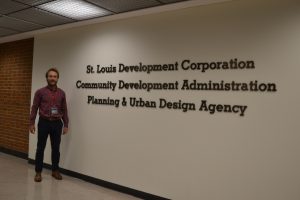This is part of series of posts by recipients of the 2020 Career Services Summer Funding Grant. We’ve asked funding recipients to reflect on their summer experiences and talk about the industries in which they spent their summer. You can read the entire series here.
This entry is by Andrew Knop, Weitzman School of Design ’21
 Summer 2020 has been a memorable one for many reasons. I was very fortunate to have received funding to support me while interning back in my hometown of St. Louis, Missouri at the St. Louis Development Corporation – the city’s economic development agency. My internship has provided a diverse set of experiences professionally, but also personally, and has created more opportunity for my future.
Summer 2020 has been a memorable one for many reasons. I was very fortunate to have received funding to support me while interning back in my hometown of St. Louis, Missouri at the St. Louis Development Corporation – the city’s economic development agency. My internship has provided a diverse set of experiences professionally, but also personally, and has created more opportunity for my future.
I was hired on to the Development Incentives team, whose mainly responsibility is to analyze incentive applications from developers and make recommendations to the Land Clearance for Redevelopment Authority – which approves various incentives (tax abatement or tax exempt revenue bonds) – and the Tax Increment Financing Commission – which approves TIFs. The Development Incentives team also houses smaller teams that manage commercial corridors, facade grant programs, and Opportunity Zone outreach and development. It is a versatile and dynamic team that exposed me to all facets of the organization.
My main responsibility was to work with the Financial Incentive Analysis model created by a colleague, Jonathan Ferry (one of the International Economic Development Council’s 40 Rising Stars under 40). The model focuses on meeting the long-term infrastructure needs of the city by allocating these expenses using a land use economic opportunity cost model. While not yet an expert on the model, I have benefited by working with and studying the methodology behind the model to better understand how cities can responsibly promote smart growth.
St. Louis Development Corporation, and the city of St. Louis, is in a time of change and evolution. Data cleaning and modernization have become a high priority. I have been able to involve myself in these efforts within a larger team. New software and project management systems to create a more efficient and effective organization are being implemented. Simultaneously, the agency is pushing towards greater transparency and accountability to the public, particularly regarding development incentives. I have worked on a project that coincides with both initiatives. The project has been to compile historical incentivized project data from multiple sources and to create a template for future data collection so that the team (and other parties) will have a singular source of record keeping and data for analysis. Part of this effort has been to model older projects receiving development incentives according to the latest version of the financial analysis model – this ensures that comparable metrics exist going back several years. Not only will this new database be useful internally, but it will also create opportunities to make data readily available to the public. Both internally and externally incentives will then be scrutinized. I have a created an interactive and visually appealing dashboard with a map and various charts that will (hopefully) be incorporated into a public website so that many stakeholders can learn more about the city’s use of development incentives – where, how much, what type, etc.
St. Louis Development Corporation is a flexible environment and I have been fortunate to have been given the freedom to pursue projects outside of main responsibilities. I volunteered to help survey local small businesses affected by the civil unrest earlier this summer. This involved physically talking to business owners about any property damage they received. The result of this effort was to apply for federal grant money to assist these businesses. It was a valuable experience to hear the different perspectives each owner had as they traversed a complex situation. Other projects undertaken include helping on the agency’s efforts surrounding Missouri Main Street’s UrbanMain pilot program, researching and providing analysis on a South St. Louis commercial corridor, and providing feedback on St. Louis’ very first comprehensive economic development plan – the Equitable Economic Development Framework released by St. Louis Development Corporation.
I have gained much value from this experience and am very appreciative of the funding to support my ability to take on this internship. I have learned a great deal, have been exposed to the “real world” of economic development, and have made connections for the future. I am even lucky enough to have my internship extended remotely into the fall semester. I hope that this summer leads to more success for myself and others.




